by Lisa Cooke | Sep 16, 2016 | 01 What's New, Records & databases |
Scandinavian genealogy records for this week pique the interest of researchers all over the world. Large collections of records for Sweden and Finland are among the list of new and updated genealogical records. Other collections include records for London, Ireland, and the United States. Oh! One last thing. We’ve added a Google search strategy you won’t want to miss!
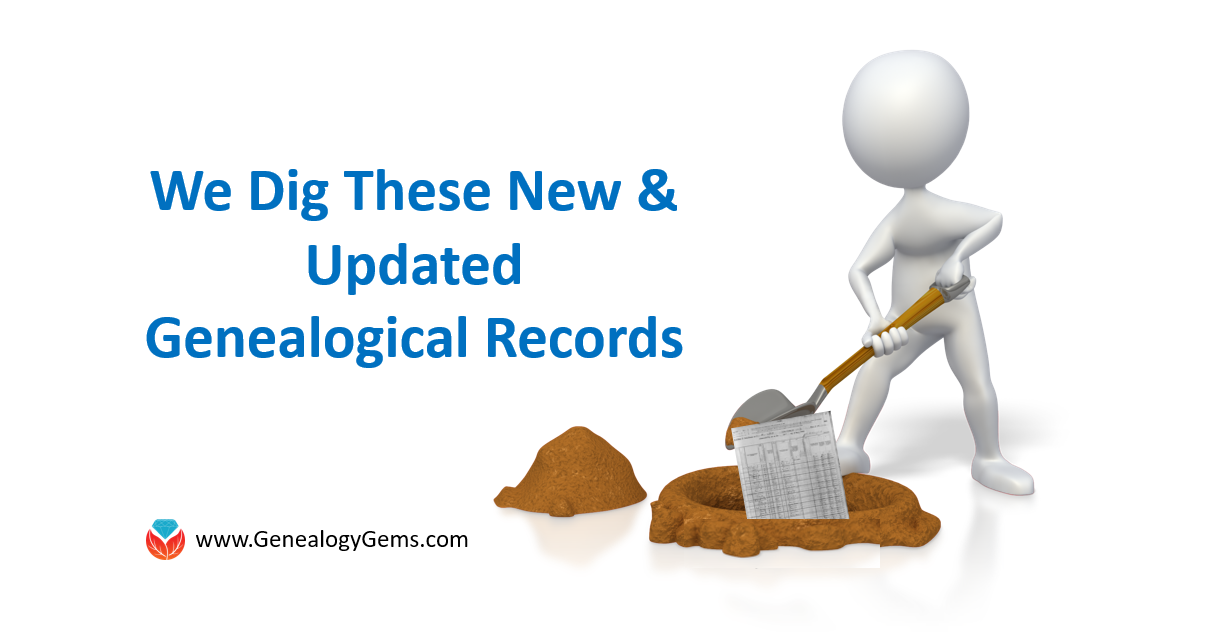
Sweden – Church Records
FamilySearch recently updated a collection of church records for Sweden titled “Sweden, Gävleborg Church Records, 1616-1908; index 1671-1860,” this week. The collection includes church records from the county of Gävleborg. These church records include clerical surveys; registers of birth, marriages, and deaths; move-in and move-out lists; confirmations; and church accounts.
The digital images span the years of 1616-1908, however the records that are searchable by index (at this time) only include the years between 1671 and 1860. When browsing through the digital images that have not been indexed, you will want to search by parish, then by record type, and lastly, the volume and year.
Finland – Church Records
MyHeritage has published an impressive collection of 33 million Finnish historical records! This collection of church census books and pre-confirmation books were kept by the Lutheran Church in Finland. The reason these records are so important is that the Lutheran Church was the state religion for hundreds of years. Because of that, the church records essentially cover the entire population of Finland.
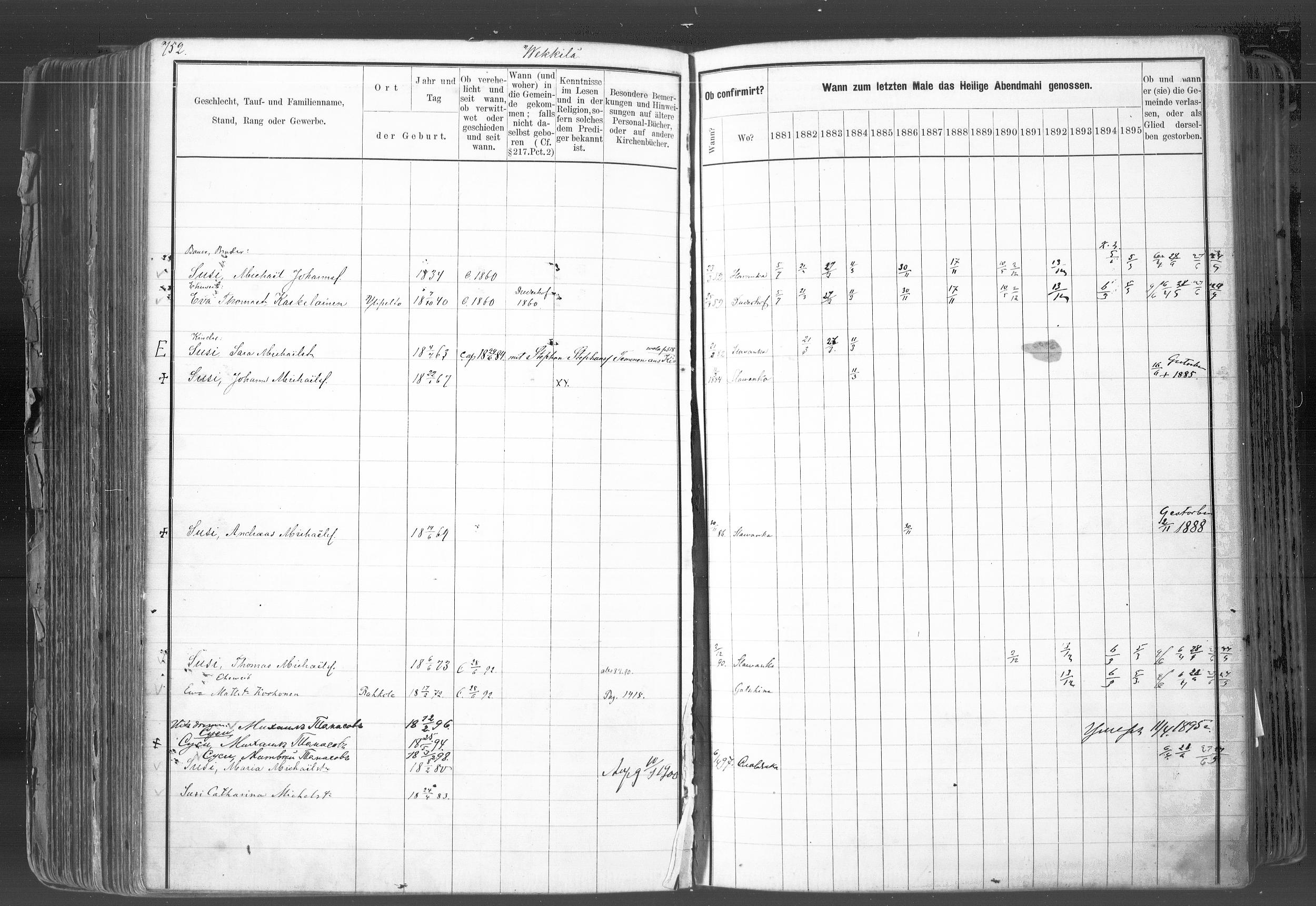 In rural areas, the church book records are organized by village, farm, and household. Within the cities these records were organized by quarter or street.
In rural areas, the church book records are organized by village, farm, and household. Within the cities these records were organized by quarter or street.
It is important for researchers to realize that Finland was part of Sweden until 1809. Church census records and pre-confirmation records were consequently written in Swedish until the mid-to-late 1800s. Don’t forget – FamilySearch wiki will give you a language cheat-sheet so you can get help with translating!
United Kingdom – London – Post Office Directories
London Post Office Directories 1842, 1851 and 1861, a browse only database at this time, is now available at Findmypast. You can browse over 1.5 million records from three London Post Office Directories. These directories include lists of traders, bankers, people employed by the crown, lawyers, and other officials. Though not indexed, they list names alphabetically by surname. You may be able to find your ancestor’s occupation, business address, or even their home address!
United Kingdom – Westminster
This collection from Westminster, Poor Law and Parish Administration includes over 1.7 million records. The parish administration was over several commissions and these records include bastardy papers, admissions, examinations, pauper records, valuations, and work house records.
Because there are so many different types of records in this collection, the amount of genealogically valued data will vary. Transcripts and digital images of the original documents are provided and can be searched by name, year, place, and record type.
Ireland – General Register Office Records
Irish Genealogy.ie has just released millions of personal records online for free! Births, marriages, and deaths are from the General Register Office. The expanded database includes the Birth Records Indexes from 1864 to 1914, the Marriage Records Indexes from 1845 (1864 for Roman Catholic Marriages) to 1939, and the Death Records Indexes from 1864 to 1964. To search these records, click here. You will find them under the Civil Records menu heading.
United States – New York City, Philadelphia, & Washington D.C. Newspapers
18th-century newspapers from three early capitals of the U.S. are new on the Chronicling America website. Browse through these digital newspapers for information about your ancestors. Nearly 15,000 pages have been added from The Gazette of the United States (New York, N.Y. and Philadelphia, Pa., 1789-1801), the National Gazette (Philadelphia, Pa., 1791-1793), and the National Intelligencer (Washington, D.C. 1800-1809). For even more information on how to boost your genealogy success using newspapers, check out Lisa’s book, “How to Find Your Family History in Newspapers,” in a digital e-book or traditional book form.
More Gems on Scandinavian Genealogy Records
Our Genealogy Google Guru Lisa Louise Cooke has a few more ideas for gaining access to more records and information about your Scandinavian ancestors. Here’s what Lisa says:
“You’ve probably already tried searching with Google to find more on your ancestors. But have you searched in Swedish, Finnish, or Norwegian? Start by going to Google Translate and entering your search query in English.
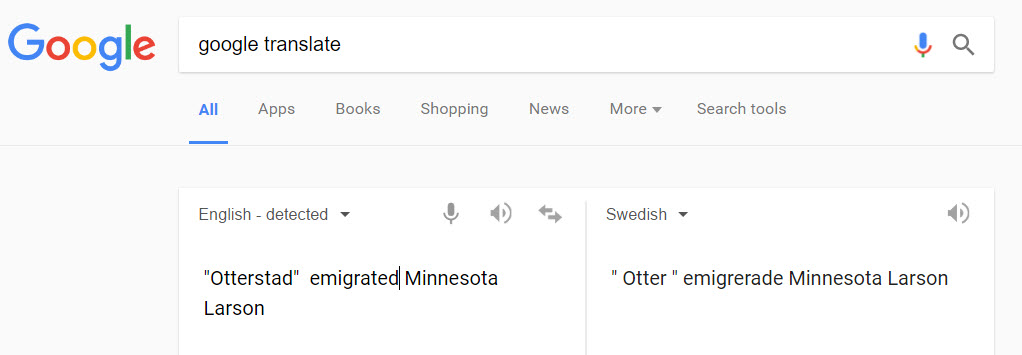
Google Translate will detect that you have typed in English. You’ll need to select the desired language from the drop-down menu in the box on the right. Above, I’ve selected Swedish. Google Translate has now translated my query. Highlight and copy the translated text.
Next, go to the Swedish version of Google, which you’ll find at https://www.google.se/. Paste the translation in the search box. I’ve changed “Otter” back to the actual name of the town “Otterstad,” because I didn’t need that to be translated! Here are my search results:
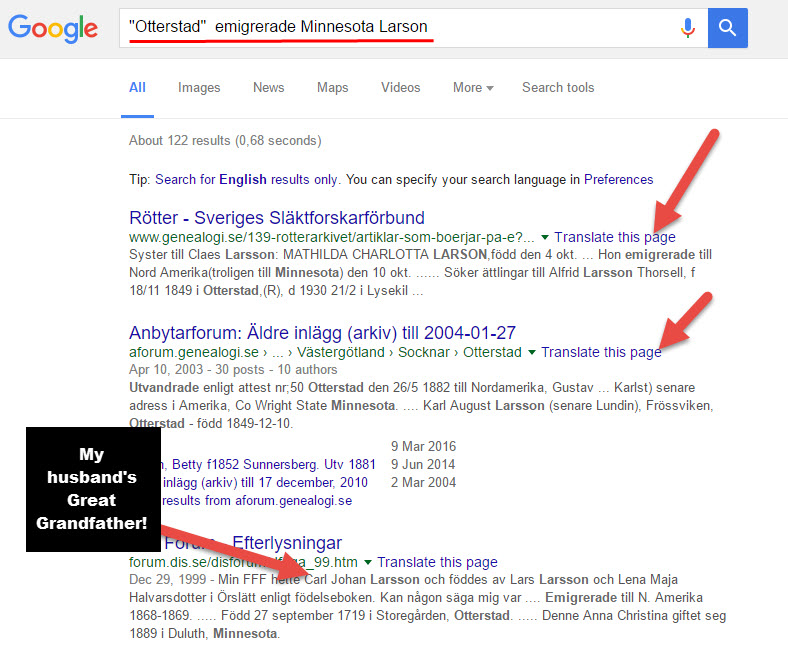
Notice, each webpage search result has a link you can click to “Translate this page.” Click it and you’ll go to that page, but it will appear in English!
I’m thrilled to see my husband’s great-great-grandfather’s name in this bottom result. I’m off to work on this family…have fun with Google Translate and the Scandinavian Googles!” – Lisa
Isn’t th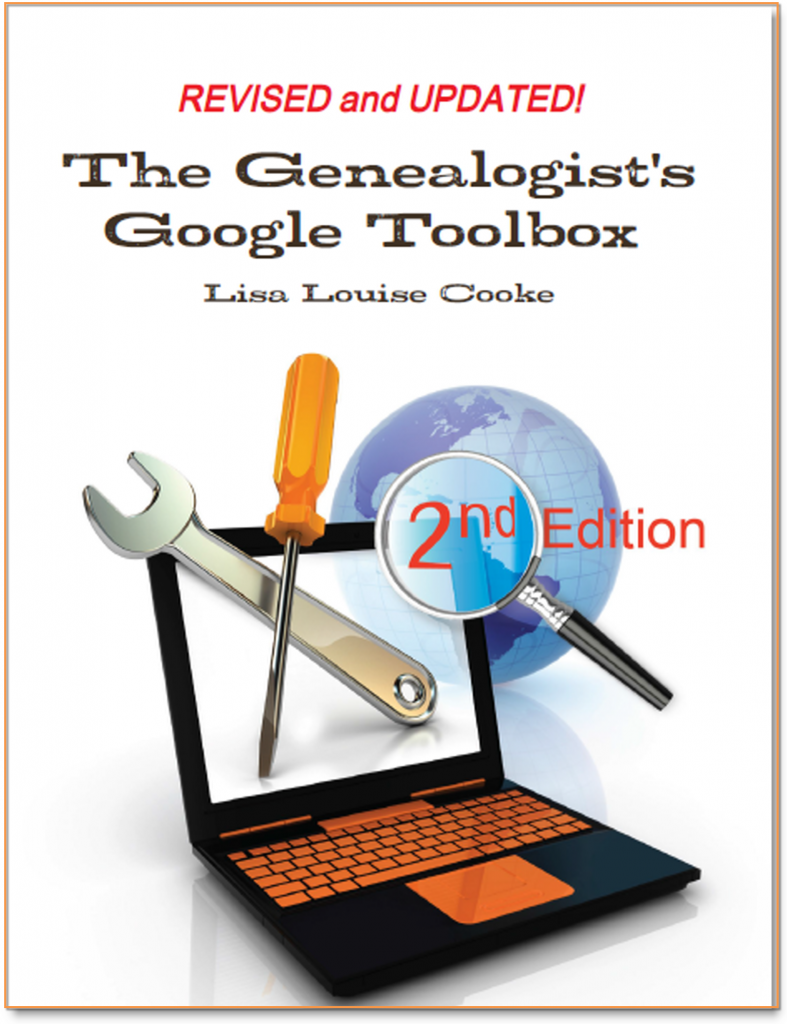 at an awesome search strategy?! This is exactly the kind of outside-the-box thinking Lisa is known for which she covers more in-depth in her book The Genealogist’s Google Toolbox Second Edition. In fact, there’s an entire chapter in the book about how to use Google Translate in exciting, innovative ways for genealogy.
at an awesome search strategy?! This is exactly the kind of outside-the-box thinking Lisa is known for which she covers more in-depth in her book The Genealogist’s Google Toolbox Second Edition. In fact, there’s an entire chapter in the book about how to use Google Translate in exciting, innovative ways for genealogy.
Here are the links Lisa sent me for the various Scandinavian Googles:
And finally, here’s more on Scandinavian research from our website:
by | Jul 22, 2016 | 01 What's New, Records & databases |

New record collections for the United Kingdom offer a royal treat for your week! You will find new collections for monumental inscriptions, British newspapers, and baptisms. And for the cherry on top, see the new and updated collections for the U.S. Military and the great state of Texas!
UNITED KINGDOM – WORCESTERSHIRE & OTHER COUNTY TOWNS
A new record collection at Findmypast entitled Worcestershire Monumental Inscriptions is now available. A monumental inscription is an etching carved into stone, wood, or on a plaque as a memorial to a person buried there. Monumental inscriptions are an important source for genealogical data. Many will include more than one name and help trace further family connections. Name, year of death, and a location are some of the things often carved into these monumental inscriptions. What is even better is if you find an ancestor in these Worcestershire Monumental Inscriptions, you can pop over and look for a baptismal record in the Worcestershire Baptisms collection.
Another new monumental inscription collection at Findmypast is entitled Aberdeenshire, Banffshire, & Kincardineshire Monumental Inscriptions. These records are going to include more data than the Worcestershire inscriptions. Name, date of death, denomination, graveyard name, special inscriptions, and even some notes may be included in these transcribed records. Many of these records will also hold multiple names.
UNITED KINGDOM – NEWSPAPERS
Findmypast has updated their British Newspapers 1710-1953 collection this week, too. There are literally thousands of local and regional publications across England, Wales, and Scotland. Each page has been digitized and indexed, which makes it super simple to find what you are looking for!
UNITED STATES – MILITARY
Fold3 now has WWI Draft Registration Cards as a searchable online database. In 1917 and 1918, about 24 million men living in the U.S. filled out a World War I draft registration card. These draft cards will contain a name, date of birth (if known), birthplace, citizenship status, and information on a relative or close associate. Even though this record collection is only about 14% complete, you may find the person you have been wondering about. Don’t forget to check back often as more records are made available.
UNITED STATES – TEXAS
FamilySearch helps the Lonestar State researchers with the Texas, Tax Rolls, 1837-1910 records. This collection has indexed records for only 231 out of the 254 counties in Texas, but you can still find records that have not been indexed by using the browse only feature. [Tip: Read step-by-step instructions for how to access the browse only databases here.]
Texas tax roll records include the first year for each county included prior to 1845, as well as 1855, 1865, 1875, 1885, 1890, 1895, and 1905. There are some gaps in several years of some counties. Ellis County, 1886, images 114, 116, 118, 120, 122, 124, 126, 128, 130, 132, and 134 are cut off on the left side, so some of the beginning letters of the surnames are missing.
Information in Texas tax records include:
- Name of owner
- Assessment number
- Original grantee
- Number of acres of land
- Value
- Town plot description
- Name of city or town
- Kind, number, and value of livestock
- Kind, quantity, and value of farm commodities
- Amount of state taxes
- Amount of county taxes
MORE GEMS ON NEWSPAPER RESEARCH FOR GENEALOGY
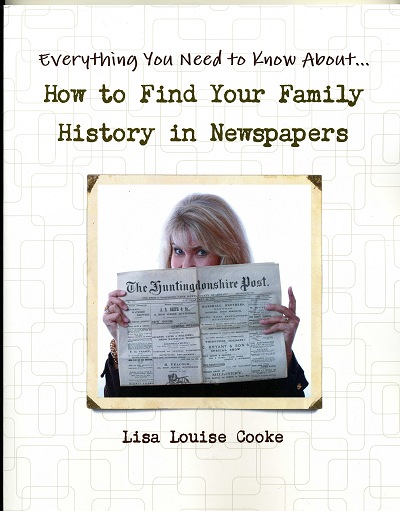
Are you looking for some tips and tricks to find and research newspaper articles for your family history? Lisa shares all her valuable know-how and years of experience in her book How to Find Your Family History in Newspapers. Available in both a printed copy and digital version, this book provides you with a fool-proof research process and is stuffed with everything you need for genealogical success in newspaper research!
by Lisa Cooke | Sep 18, 2015 | 01 What's New, Ancestry, FamilySearch, images, Immigration, Italian, Newspaper, Records & databases, United States
Every week we blog about new genealogy records online. Which ones could be the key to busting your genealogy brick walls? New this week? Vital records for Delaware, South Dakota, Illinois and Texas. Italy civil registrations. Newspapers from Indianapolis, Louisville KY and San Bernadino CA. Immigrant passenger lists for Mississippi ports.

DELAWARE VITAL RECORDS. Over a million images of vital records from Delaware (1650-1974!) have been added to a 3-million strong collection you can browse at FamilySearch. Images of birth, marriage and death records for the city of Wilmington, Delaware are also newly browsable on FamilySearch. These date mostly to 1881. Birth records end in 1919; marriages and deaths in 1954.
ILLINOIS BIRTH CERTIFICATES. Over 370,000 births from Cook County, Illinois (home to Chicago) are now indexed at FamilySearch. These span 1878-1938; more records will be added on an ongoing basis.
ITALY CIVIL REGISTRATION. FamilySearch continues to churn out newly-digitized Italy civil registrations to its free site. They’re not indexed yet, but these are newly browsable: Arezzo (back to the 1300s!), Bergamo, Cremona, Enna, Imperia (San Remo) and nearly a million images for Pescara. Birth, marriage and death records may all contain important genealogical information.
U.S. NEWSPAPERS. Newspaper.com subscribers now have access to over 200,000 pages (1868-1922) from The Courier-Journal (Louisville, KY), over 107,000 pages (1907-1922) from The Indianapolis Star (IN) and 1.3 million pages (1894-1998) from The San Bernadino County Sun (CA)
U.S. IMMIGRATION–MISSISSIPPI PORTS. Indexed images of passenger arrival records at the ports of Gulfport (1904-1964) and Pascagoula (1903-1935, 1955-1964) are now available to Ancestry subscribers. According to the database description, “they typically include the name of the vessel and arrival date, ports of departure and arrival (as well as future destinations on a ship’s itinerary), dates of departure and arrival, shipmaster, full name, age, gender, physical description, military rank (if any), occupation, birthplace, citizen of what country, and residence. For military transports, you may find the next of kin, relationships, and address listed as well. Later manifests may include visa or passport numbers.”
SOUTH DAKOTA BIRTHS AND MARRIAGES. Nearly 700,000 indexed records comprise this new FamilySearch collection. The collection spans 1843-2014.
TEXAS MARRIAGES. About 1.3 million indexed records and related images have been added to a Texas county marriage records collection at FamilySearch.
 Please help us spread the word about these new genealogy records online! Thank you! You are a gem!
Please help us spread the word about these new genealogy records online! Thank you! You are a gem!
by Lisa Cooke | Jan 9, 2015 | 01 What's New, Ancestry, Newspaper, Research Skills
 Recently Sue from Elk Grove, Illinois wrote in with a question about what to do when records were lost due to fire (or war, or disasters, etc.):
Recently Sue from Elk Grove, Illinois wrote in with a question about what to do when records were lost due to fire (or war, or disasters, etc.):
“We have been trying to locate information on my great great grandparents Hugh and Mae Sullivan. I have never been able to find marriage or birth records and have realized that it was mainly due to the Great Chicago Fire of 1871. Interestingly, through a directory from 1866, they may have lived only blocks from the origin of the fire. I have them in 1880 with 4 sons, the first of which was born just 10 months following the fire.
“I suspect that they may have lost other children in the tragedy. I am unsure which direction to go to find more of their story and any suggestions would be helpful. Several newspapers are reported to have lists of the missing but I have either been unable to read them or to locate them. Sam Fink’s list [an index of Cook County marriages and deaths] did not provide any information. I suspect that my ancestors were among the very poor immigrants that flooded into Chicago. There were relief societies and I have wondered if records were kept of those who were rehoused.”
Here’s my response to Sue:
 I think you are on the right track with newspapers. Newspapers.com (owned by Ancestry) carries the Chicago Daily from 1871. Here is a screen shot of the List of Missing from Oct. 11, 1871. It might be worth a subscription to Newspapers.com to be able to really comb through all the issues.
I think you are on the right track with newspapers. Newspapers.com (owned by Ancestry) carries the Chicago Daily from 1871. Here is a screen shot of the List of Missing from Oct. 11, 1871. It might be worth a subscription to Newspapers.com to be able to really comb through all the issues.
 Here’s a tip on working with less-than-the best digital images of historical newspapers. You can “invert” the actual image (have it read white-on-black instead of black-on-white), then darken it and add a little more contrast to get the most readable copy possible. This can be done right from the Newpapers.com viewer.
Here’s a tip on working with less-than-the best digital images of historical newspapers. You can “invert” the actual image (have it read white-on-black instead of black-on-white), then darken it and add a little more contrast to get the most readable copy possible. This can be done right from the Newpapers.com viewer.
Also, in Family History podcast episode #37 I discussed a book specifically on Chicago research: Finding Your Chicago Ancestors: A Beginners Guide To Family History In The City Of Chicago by Grace DuMelle. As I recall, it was a very comprehensive book and could give you good leads on where to look.
by Grace DuMelle. As I recall, it was a very comprehensive book and could give you good leads on where to look.
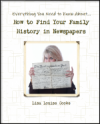
For more tips like these, read my book How to Find Your Family History in Newspapers. Inside you’ll find:
- Step-by-Step Instructions
- Worksheets and Checklists
- Tech Tools You Probably Aren’t Using But Should
- A Massive Amount of Location Specific Websites and a Case Study that Puts It Al Together
by | Nov 4, 2014 | 01 What's New, African-American, Digital Archives, History, Memory Lane, Military, Newspaper

The Evening World (New York, NY), Sept 10, 1900, Evening Edition, Page 2. Digitized image from Chronicling America.
If you research ancestors in the U.S., you’ve probably already used the Library of Congress’ Chronicling America website for searching digitized newspapers. Now they’ve added a new feature: you can subscribe to receive “old news” on many of your favorite historical topics!
Here’s how it works. You can sign up for weekly notifications that highlight interesting and newly-added content on topics that were widely covered in the U.S. press at the time. (Click here to see a list of topics.)
My favorite family history-related topics are natural disasters (like the Chicago fire or Galveston flood), war topics (from Appomattox to World War I) and civil and human rights events (from the Railroad Strike of 1886 to Ellis Island to coverage of Pullman porters). But there are a lot of topics that might relate to your family: industrialization (electric cars!), arts, sports (think Babe Ruth and the Boston Marathon), major crimes and trials, politics, holidays and public celebrations and public works and technology marvels (like the Panama Canal or Titanic).
To subscribe, just use the icons at the bottom of the Chronicling America home page.
 Learn more about finding your ancestors in the newspaper in Lisa’s book, How to Find Your Family History in Newspapers. She walks you through the process of determining which newspapers might mention your ancestors and where to find those papers (both online and offline). You’ll learn in detail about Chronicling America and more about other free and subscription options for searching online newspapers. Best of all, Lisa shares mouthwatering examples from her own research that show you why newspapers can be such a valuable source of information on our family history.
Learn more about finding your ancestors in the newspaper in Lisa’s book, How to Find Your Family History in Newspapers. She walks you through the process of determining which newspapers might mention your ancestors and where to find those papers (both online and offline). You’ll learn in detail about Chronicling America and more about other free and subscription options for searching online newspapers. Best of all, Lisa shares mouthwatering examples from her own research that show you why newspapers can be such a valuable source of information on our family history.

 In rural areas, the church book records are organized by village, farm, and household. Within the cities these records were organized by quarter or street.
In rural areas, the church book records are organized by village, farm, and household. Within the cities these records were organized by quarter or street.

 at an awesome search strategy?! This is exactly the kind of outside-the-box thinking Lisa is known for which she covers more in-depth in her book The Genealogist’s Google Toolbox Second Edition. In fact, there’s an entire chapter in the book about how to use Google Translate in exciting, innovative ways for genealogy.
at an awesome search strategy?! This is exactly the kind of outside-the-box thinking Lisa is known for which she covers more in-depth in her book The Genealogist’s Google Toolbox Second Edition. In fact, there’s an entire chapter in the book about how to use Google Translate in exciting, innovative ways for genealogy.




 I think you are on the right track with newspapers.
I think you are on the right track with newspapers. 






